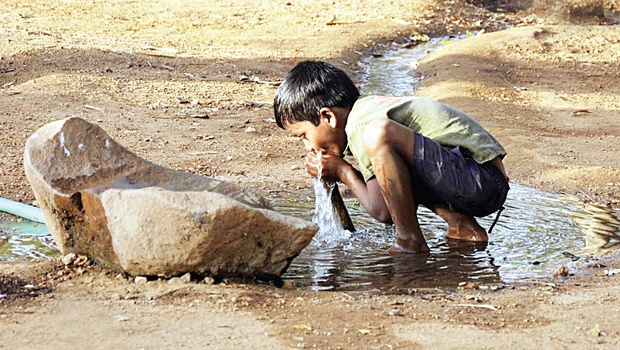Corporate Citizens Initiate Water Conservation, Replenishment Initiatives
The well-known Bengali Poet and Nobel Laureate, Rabindranath Tagore had once rightly pointed out that, “You can’t cross the sea merely by standing and staring at the water.” Looking at the dire water supply and conservation scenario nationwide, it is similarly pertinent that every section of society – the governmental agencies, citizens and corporates do their bit rather than merely lament about the situation.
Citizens may not have cohesion or expertise to execute community level initiatives and Governmental agencies are usually strapped by inadequate fund allocation and insufficient expertise. However, corporates can come forward and bring in their knowledge towards reducing water stress in nearby communities, wherever they have operations.
There might be questions from certain quarters about the urgency for taking action in regard to water recycling and conservation measures. For such uninformed individuals, it may be pertinent to point out that India’s average annual per capita water may reduce to 1340 cubic meters in 2025 and 1140 cubic meters in 2030 due to the rise in population. In 2001 it was measured to be 1820 cubic meters, and in 2011 it was 1545 cubic meters.
Even this lower availability of water is not uniformly distributed nationwide with some regions facing a much calamitous situation. It must further be mentioned that people from lower strata of society or with inadequate means and access to clean water sources are more vulnerable to water stress in comparison to their affluent brethren.
Many people will cringe on learning that authorities in South Africa’s Cape Town may stop piped water in the next few weeks due to extreme water shortage. This will be replaced with setting up of 200 water collection points to ensure the legally guaranteed minimum of 25 litres per person per day within 200 metres of every citizen’s home.
Even closer to home, the biggest threat India faces is not from external insurgency or war but internal conflicts due to water sharing disputes. India today simmers with river water sharing disputes of Mandovi River between Goa, Karnataka and Maharashtra; Cauvery River between Karnataka and Tamil Nadu; Krishna River between Karnataka, Telangana, Andhra Pradesh and Maharashtra, a few widely publicised river water disputes yet to be settled amicably amongst all stakeholders.
Irrespective of commercial activity or sector, businesses and industries cannot survive without an adequate water supply. But with ordinary human beings them-selves receiving lesser and lesser water, the industries or corporates are much lower on the authorities’ priority lists in resource distribution.
Corporates, however, have the advantage of vast in-house expertise, resources and structured planning that might be missing in many citizen level community initiatives. If these corporates enthusiastically initiate water conservation and replenishment techniques – it will not merely lessen the strain on water but also benefit nearby communities and overall society.
For instance, few socially responsible corporates have signed the Mission on Sustainable Growth (MSG), a business code developed by CII (Confederation of Indian Industries) that targets 10 parameters; one of them being for water reduction and conservation.
Of the total water used in India, about 80-83 per cent is consumed by agriculture, 10-12 per cent by industries and around 5-7 per cent for domestic use. In spite of the lower percentage of water usage for industrial purposes, it can still make a huge positive impact because any additional savings could be channelised to water starved agricultural and deficit facing domestic segments.
The noteworthy point is that corporates are taking up various initiatives such as rainwater harvesting and water recycling. In fact, water recycling can be extremely successful across industries since a large pie of the total water footprint of the industry is needed for non-potable purposes which require lower water quality vis-à-vis potable water. This also reduces the impact on draw of water from natural sources. It also makes business sense for corporates to undertake water conservation and replenishment activities since water is crucial for business or industrial activities. Any disruption in water supply can have disastrous effects on business continuity and hence lowering external dependency is always a smart decision.
Few corporates are however going further than the traditional mandate of ensuring adequate water supply for themselves through conservation and replenishment initiatives beyond their fence. Such corporates, through their CSR initiatives, are working on reviving traditional water management resources like ponds and have also converted mined-out pits to serve as water reservoirs. In addition, some others are actively involved in initiatives such as recharging of groundwater levels through integrated watershed management initiatives so that nearby communities can also reap its benefits.
 Anup Mathew is currently the Senior Vice President and Business Head of Godrej Construction. Prior to Godrej, he had a relatively short work experience with the Essar Group. He also holds a Diploma from The Swedish Institute of Management, Stockholm, Sweden. He was one of the 14 Indians who were selected with a scholarship for the CII-Nehru Fulbright Fellowship Program in the Year 2012. He completed the Fulbright Program from The Tepper School of Business at Carnegie Mellon University, Pittsburgh, Pennsylvania, U.S.A.
Anup Mathew is currently the Senior Vice President and Business Head of Godrej Construction. Prior to Godrej, he had a relatively short work experience with the Essar Group. He also holds a Diploma from The Swedish Institute of Management, Stockholm, Sweden. He was one of the 14 Indians who were selected with a scholarship for the CII-Nehru Fulbright Fellowship Program in the Year 2012. He completed the Fulbright Program from The Tepper School of Business at Carnegie Mellon University, Pittsburgh, Pennsylvania, U.S.A.
Views of the author are personal and do not necessarily represent the website’s views.
Thank you for reading the story until the very end. We appreciate the time you have given us. In addition, your thoughts and inputs will genuinely make a difference to us. Please do drop in a line and help us do better.
Regards,
The CSR Journal Team
Subscribe













